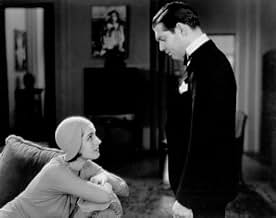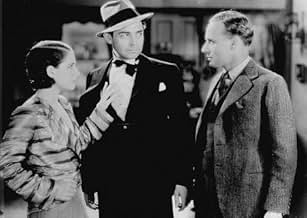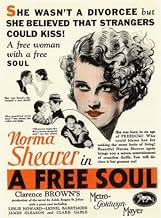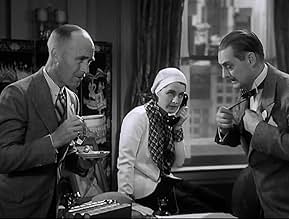IMDb-BEWERTUNG
6,6/10
3132
IHRE BEWERTUNG
Ein alkoholkranker Anwalt, der einen berüchtigten Spieler wegen Mordes erfolgreich verteidigt hat, protestiert, als seine freigeistige Tochter eine Liebesbeziehung mit ihm eingeht.Ein alkoholkranker Anwalt, der einen berüchtigten Spieler wegen Mordes erfolgreich verteidigt hat, protestiert, als seine freigeistige Tochter eine Liebesbeziehung mit ihm eingeht.Ein alkoholkranker Anwalt, der einen berüchtigten Spieler wegen Mordes erfolgreich verteidigt hat, protestiert, als seine freigeistige Tochter eine Liebesbeziehung mit ihm eingeht.
- 1 Oscar gewonnen
- 4 Gewinne & 2 Nominierungen insgesamt
Roscoe Ates
- Man Shot at in Men's Room
- (Nicht genannt)
Ann Brody
- Hamburger Saleslady
- (Nicht genannt)
Edward Brophy
- Slouch
- (Nicht genannt)
Clarence Burton
- Detective
- (Nicht genannt)
James Donlan
- Reporter
- (Nicht genannt)
Bess Flowers
- Birthday Party Guest
- (Nicht genannt)
Francis Ford
- Skid Row Drunk
- (Nicht genannt)
Henry Hall
- Detective in Raid
- (Nicht genannt)
George Irving
- Johnson - Defense Attorney
- (Nicht genannt)
Edward LeSaint
- Judge
- (Nicht genannt)
Eric Mayne
- Party Guest
- (Nicht genannt)
Sam McDaniel
- Casino Valet
- (Nicht genannt)
Empfohlene Bewertungen
Johnny Cochrane must've learned some legal tricks from this old movie. For example, at the beginning of the movie, Lionel Barrymore gets Clark Gable acquitted of first degree murder when he places the hat found at the scene of the crime on Clark's head ... clearly the hat is too small. The court and jury laugh, and Clark is set free!
This entire movie was great -- much better than I had expected. I saw two Norma Shearer movies recently with a similar-sounding plot recap: Their Own Desire (Norma Shearer falls for the son of her father's illicit lover), and this one, A Free Soul (Norma Shearer falls for her lawyer father's mobster client). Having watched Their Own Desire first and not being impressed with it, I wondered if I should even bother with A Free Soul. But bother I did, and I'm glad for it. It was an excellent movie.
Lionel Barrymore is the black sheep of his snooty, well-heeled family. His wife died while giving birth to their only child, Jan (Norma Shearer). Being the black sheep, Lionel raised Norma to be a "free soul", to not be afraid of anyone or anything, to not be afraid to make mistakes, and to pick herself up and dust herself off whenever she did find herself in trouble. This has apparently worked well for Norma, until she meets and eventually tries to get away from Clark Gable. Norma finally learns there are consequences to all actions, that one can't be a "free soul" without it having some type of repercussion on one's life.
We also have Lionel Barrymore (whom I always love in anything I see him in) this time very compelling as a brilliant alcoholic lawyer who loves his daughter more than anything but who ultimately doesn't know how to protect her. He disappoints her, and he disappoints himself, but in the end he seeks to right his wrongs by defending Norma's ex-fiancé (to say more would be to possibly spoil the movie).
This movie was fresh, and the characters were sympathetically developed without ever resorting to being maudlin or melodramatic. This movie was also chock-full of great lines. For example:
(Lionel to Clark, upon learning Clark wants to marry Norma) - "The only time I hate democracy is when one of you mongrels forgets where you belong!"
(Norma to Clark, trying to get Clark to quit talking and make love to her) - "Men of action are better in action; they don't talk well."
Great early pre-code movie.
This entire movie was great -- much better than I had expected. I saw two Norma Shearer movies recently with a similar-sounding plot recap: Their Own Desire (Norma Shearer falls for the son of her father's illicit lover), and this one, A Free Soul (Norma Shearer falls for her lawyer father's mobster client). Having watched Their Own Desire first and not being impressed with it, I wondered if I should even bother with A Free Soul. But bother I did, and I'm glad for it. It was an excellent movie.
Lionel Barrymore is the black sheep of his snooty, well-heeled family. His wife died while giving birth to their only child, Jan (Norma Shearer). Being the black sheep, Lionel raised Norma to be a "free soul", to not be afraid of anyone or anything, to not be afraid to make mistakes, and to pick herself up and dust herself off whenever she did find herself in trouble. This has apparently worked well for Norma, until she meets and eventually tries to get away from Clark Gable. Norma finally learns there are consequences to all actions, that one can't be a "free soul" without it having some type of repercussion on one's life.
We also have Lionel Barrymore (whom I always love in anything I see him in) this time very compelling as a brilliant alcoholic lawyer who loves his daughter more than anything but who ultimately doesn't know how to protect her. He disappoints her, and he disappoints himself, but in the end he seeks to right his wrongs by defending Norma's ex-fiancé (to say more would be to possibly spoil the movie).
This movie was fresh, and the characters were sympathetically developed without ever resorting to being maudlin or melodramatic. This movie was also chock-full of great lines. For example:
(Lionel to Clark, upon learning Clark wants to marry Norma) - "The only time I hate democracy is when one of you mongrels forgets where you belong!"
(Norma to Clark, trying to get Clark to quit talking and make love to her) - "Men of action are better in action; they don't talk well."
Great early pre-code movie.
I thought A Free Soul an interesting exploration into the world of addiction--father Stephen Ashe, as played by Lionel Barrymore, struggles to balance his career as a defense lawyer and the disastrous effects his alcoholism has on his family and social life. Daughter Jan (Norma Shearer) has a similar problem--but her addiction is to a free and easy lifestyle, with no commitments and no responsibility. Both seem to be ways of dealing with an unspoken loss--perhaps that of a wife and mother. Again, as with all good storytelling, backstory is only hinted at but the characters are rich enough to imply a great deal of history. Refreshing to see Clark Gable as a suave, handsome but ultimately despicable character. A surprising lack of stereotypes for such a film-the Ashes are a patrician, proper family who virtually disown Stephen and his daughter, but they are shown to be intelligent, unique people none the less. A wonderful, melodramatic exploration of the relationship of a father and daughter. Some nice location work for an early talkie.
For those of you who did not have the dubious pleasure of seeing one of Elizabeth Taylor's lesser films, The Girl Who Had Everything, here's the original film it was taken from. A Free Soul is the story of a girl who misuses the freedom her father gave her in her upbringing.
The film is based on a story Adela Rogers St. John wrote, that drew from her relationship with her father, famed criminal defense attorney Earl Rogers. Rogers set the mold for the famous criminal attorneys we've seen in action down to today. Unfortunately he was a man with a severe drinking problem which in the end got the better of him.
He did not come from the upper crust that Lionel Barrymore as Stephen Ashe comes from. In fact the real Earl Rogers's father was a minister. Yet Barrymore creates a compelling and brilliant, but dissolute figure who raises his daughter to be broadminded and tolerant and to despise some of the snobs from her class.
Norma Shearer takes the lessons to heart only too well. She leaves stalwart beau, polo playing Leslie Howard, for gambler/racketeer Clark Gable. Gable's a client of Barrymore's who Barrymore got off on a gambit that Johnnie Cochran used successfully defending O.J. Simpson and he's rather full of himself.
Barrymore turns out to be a bit of a snob himself in the end, telling Gable he's not good enough for his little girl. Of course Norma has her own ideas.
This film was the first really big break for Clark Gable. Movie audiences went for his animal magnetism in a big way. Even though Barrymore won the Best Actor Oscar for his performance by virtue of an unforgettable courtroom speech at the finish, it was Gable who got all the newspaper print.
Norma Shearer got a Best Actress nomination, but lost to fellow MGM contract player Marie Dressler for Min and Bill. A Free Soul which was a pre-Code film, explored the theme of sexual satisfaction ever so gingerly, but in a way after 1935 could not be seen for thirty years on the screen. Shearer is also giving one of her best screen performances.
Leslie Howard I'm afraid had real little to do, but look patient and noble as the society polo player. Howard exuded class and distinction even when he's penniless as in The Petrified Forest. So much the better for him when he's dressed in tails.
A Free Soul is light years better than The Girl Who Had Everything and holds up very well for today's audience.
The film is based on a story Adela Rogers St. John wrote, that drew from her relationship with her father, famed criminal defense attorney Earl Rogers. Rogers set the mold for the famous criminal attorneys we've seen in action down to today. Unfortunately he was a man with a severe drinking problem which in the end got the better of him.
He did not come from the upper crust that Lionel Barrymore as Stephen Ashe comes from. In fact the real Earl Rogers's father was a minister. Yet Barrymore creates a compelling and brilliant, but dissolute figure who raises his daughter to be broadminded and tolerant and to despise some of the snobs from her class.
Norma Shearer takes the lessons to heart only too well. She leaves stalwart beau, polo playing Leslie Howard, for gambler/racketeer Clark Gable. Gable's a client of Barrymore's who Barrymore got off on a gambit that Johnnie Cochran used successfully defending O.J. Simpson and he's rather full of himself.
Barrymore turns out to be a bit of a snob himself in the end, telling Gable he's not good enough for his little girl. Of course Norma has her own ideas.
This film was the first really big break for Clark Gable. Movie audiences went for his animal magnetism in a big way. Even though Barrymore won the Best Actor Oscar for his performance by virtue of an unforgettable courtroom speech at the finish, it was Gable who got all the newspaper print.
Norma Shearer got a Best Actress nomination, but lost to fellow MGM contract player Marie Dressler for Min and Bill. A Free Soul which was a pre-Code film, explored the theme of sexual satisfaction ever so gingerly, but in a way after 1935 could not be seen for thirty years on the screen. Shearer is also giving one of her best screen performances.
Leslie Howard I'm afraid had real little to do, but look patient and noble as the society polo player. Howard exuded class and distinction even when he's penniless as in The Petrified Forest. So much the better for him when he's dressed in tails.
A Free Soul is light years better than The Girl Who Had Everything and holds up very well for today's audience.
Some movies are theatrical in the sense that all their values and methods are derived from stage values. This is one.
Some movies are in that sweet spot after talkies got going and before the code was enforced, so they have a vitality that is lacking for a few decades afterwards.
This fits those two overlapping pockets and is a fine example of theatrical acting. The story is simple: a woman from a "fine" family spends time with a gangster for exciting sex. She has an unnatural bond with her "mountebank" father, a drunken lawyer both of which characteristics give him an excuse to be broad in his acting style.
The father forbids the affair and dramatic complications arise. Its an excuse for speechifying, which is done fabulously so long as you understand the tradition. Barrymore is perhaps the last great speechifier in this tradition, though Olivier would hang on for much longer and be celebrated out of nostalgia.
There's an interesting fold in this. The audience has a surrogate on screen, in the jury. Courtroom movies have since this grown into a solid tradition. As the case is made to the jury, it is made to us. This is special because was an early edition of that model, say before Mockingbird and Christie. Because of that, the speechifying to us/jury is fresher, more direct, less burdened with mature movieness.
Ted's Evaluation -- 2 of 3: Has some interesting elements.
Some movies are in that sweet spot after talkies got going and before the code was enforced, so they have a vitality that is lacking for a few decades afterwards.
This fits those two overlapping pockets and is a fine example of theatrical acting. The story is simple: a woman from a "fine" family spends time with a gangster for exciting sex. She has an unnatural bond with her "mountebank" father, a drunken lawyer both of which characteristics give him an excuse to be broad in his acting style.
The father forbids the affair and dramatic complications arise. Its an excuse for speechifying, which is done fabulously so long as you understand the tradition. Barrymore is perhaps the last great speechifier in this tradition, though Olivier would hang on for much longer and be celebrated out of nostalgia.
There's an interesting fold in this. The audience has a surrogate on screen, in the jury. Courtroom movies have since this grown into a solid tradition. As the case is made to the jury, it is made to us. This is special because was an early edition of that model, say before Mockingbird and Christie. Because of that, the speechifying to us/jury is fresher, more direct, less burdened with mature movieness.
Ted's Evaluation -- 2 of 3: Has some interesting elements.
"A Free Soul" made Hollywood take notice of a young actor by the name of Clark Gable.Slapping leading lady Norma Shearer around,he portrayed masculinity like no star,with the exception of perhaps Jim my Cagney, had done before him.Lionel Barrymore won the Oscar for his very good performance of the alcoholic defense lawyer. I've always found him overacting his parts but he's very believable in this movie.Norma Shearer is also very good,but still overdoes the dramatics with her silent screen acting.But she's really a stunner in the quiet parts. Leslie Howard has once again one of his thankless parts which doesn't tax his ability at all.A very enjoyable picture.
Wusstest du schon
- WissenswertesWhen the mule chases James Gleason, not a stuntman, is knocked down by the animal, a scene which wasn't planned, as Norma Shearer's reaction attests.
- PatzerAfter the cross-examination finishes, Stephen Ashe begins his summation to the jury. However, he is the defense attorney, and the prosecutor takes the first summation.
This "factual mistake" is, in fact, not an absolute, as it depends on the state where the trial is held. For example, in a criminal case (which this is) in the Commonwealth of Pennsylvania, the defense goes first and the Commonwealth last. (If it were a civil case in PA, the Plaintiff would go first.)
- VerbindungenFeatured in Some of the Best (1944)
- SoundtracksBy the River Sainte Marie
(1931) (uncredited)
Music by Harry Warren
Played as background music during the restaurant scene
Top-Auswahl
Melde dich zum Bewerten an und greife auf die Watchlist für personalisierte Empfehlungen zu.
- How long is A Free Soul?Powered by Alexa
Details
- Erscheinungsdatum
- Herkunftsland
- Sprache
- Auch bekannt als
- Un alma libre
- Drehorte
- Yosemite National Park, Kalifornien, USA(Jan, her father and Eddie go camping)
- Produktionsfirma
- Weitere beteiligte Unternehmen bei IMDbPro anzeigen
Box Office
- Budget
- 529.000 $ (geschätzt)
- Laufzeit
- 1 Std. 33 Min.(93 min)
- Farbe
Zu dieser Seite beitragen
Bearbeitung vorschlagen oder fehlenden Inhalt hinzufügen








































